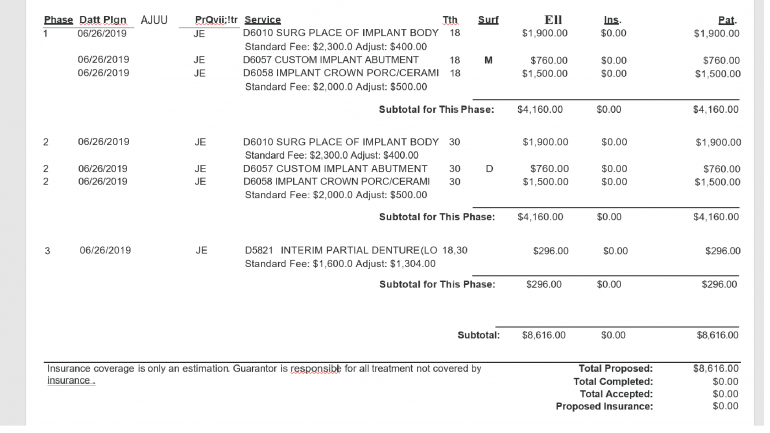
Dental Code D0602: Caries risk assessment and documentation
Dental Code D0602 Price Range & Savings
Dental Code D0602, also known as "Caries Risk Assessment and Documentation, with a finding of moderate risk," is a specific dental procedure that focuses on evaluating a patient's risk of developing dental caries (tooth decay) and documenting the findings. This code is an essential tool in preventive dentistry, allowing dental professionals to identify individuals who are at moderate risk for dental caries and develop appropriate treatment plans to prevent further decay.
On average, patients pay $70 for this D0602 service at the dentist's office, with as little as $20 charged for this in less expensive cities and as much as $90 in more expensive cities.
Low cost of living | Medium cost of living | High cost of living |
Memphis (Tennessee), Cincinnati (Ohio) | Miami (Florida), Denver (Colorado), Austin (Texas) | (New York (New York), San Francisco (California) |
$20 | $70 | $90 |
However, the price for the service D0602 depends not only on the region where you live, but also varies from dentist to dentist. Therefore, it makes sense to compare prices before choosing a dentist. The best way to do this price comparison is at Dr. BestPrice and save a lot of money.
Caries Risk Assessment
Caries risk assessment is the initial step of the procedure. The dental professional conducts a thorough evaluation to determine the patient's risk factors for dental caries. By identifying these risk factors, the dentist can develop a personalized treatment plan to mitigate the patient's risk and prevent future decay.
During the assessment, the dental professional examines various aspects such as oral hygiene practices, dietary habits, medical conditions, medications, saliva flow rate, and previous history of dental caries. These factors play a critical role in determining the patient's susceptibility to tooth decay.
For example, the dentist may inquire about the patient's brushing and flossing routine, the frequency of sugar consumption, and any underlying health conditions that may affect oral health. They may also review the patient's medical history and medications, as certain medications can cause dry mouth, which increases the risk of dental caries.
In addition to the patient interview, the dentist may use diagnostic tools such as X-rays, clinical examinations, and analysis of the patient's saliva. X-rays help identify any existing tooth decay or hidden cavities, while clinical examinations assess the condition of the teeth, gums, and oral tissues. Saliva analysis helps evaluate the quantity and quality of saliva, as saliva plays a crucial role in protecting teeth from decay.
Documentation of Caries Risk
After conducting the caries risk assessment, the dental professional documents the findings. Accurate documentation ensures that the patient's oral health history is properly recorded and aids in tracking their progress over time. This documentation includes the patient's caries risk level, detailed information about the risk factors identified during the assessment, and any additional notes or observations made by the dentist.
The documentation may include specific recommendations tailored to the patient's risk profile. These recommendations aim to reduce the chances of developing dental caries and may include dietary modifications, improved oral hygiene practices, fluoride treatments, or the use of dental sealants.
For example, if the patient has a moderate risk of dental caries due to frequent sugar consumption and inadequate oral hygiene, the dentist may recommend reducing sugar intake, increasing brushing and flossing frequency, and using fluoride toothpaste or mouth rinses. The goal is to address the identified risk factors and implement preventive measures that are most effective for the patient's unique circumstances.
Additionally, the documentation of caries risk serves as a valuable resource for future dental visits, allowing the dental professional to track the patient's progress in maintaining optimal oral health and assess the effectiveness of the recommended preventive measures. By regularly reviewing and updating the documentation, the dentist can make informed decisions regarding the patient's treatment plan and provide ongoing guidance to mitigate the risk of dental caries. This comprehensive approach ensures that the patient receives personalized care and empowers them to take an active role in maintaining their oral health.
Summary of Dental Code D0602
Dental Code D0602, "Caries Risk Assessment and Documentation, with a finding of moderate risk," is a dental procedure that involves evaluating a patient's risk of developing dental caries and documenting the findings. This assessment helps dental professionals identify patients who are at moderate risk for dental caries and develop personalized preventive treatment plans.
During the caries risk assessment, the dentist evaluates various factors, including oral hygiene practices, dietary habits, medical conditions, medications, saliva flow rate, and previous history of dental caries. This comprehensive evaluation provides a thorough understanding of the patient's risk profile.
The documentation of caries risk includes recording the patient's risk level, detailed information about identified risk factors, and any additional notes or observations made by the dentist. The documentation serves as a reference for future visits and aids in monitoring the patient's progress in maintaining optimal oral health.
By addressing specific risk factors and providing tailored recommendations, dental professionals aim to reduce the risk of dental caries and promote long-term oral health. The utilization of dental codes such as D0602 ensures accurate documentation, effective communication between dental professionals, and appropriate reimbursement for the services rendered.
In conclusion, Dental Code D0602 plays a crucial role in preventive dentistry by facilitating caries risk assessment and documentation. This procedure enables dental professionals to identify patients at moderate risk for dental caries and implement preventive measures tailored to their individual needs. By addressing risk factors and providing targeted interventions, dental professionals strive to promote optimal oral health and prevent the progression of dental caries in their patients.
Boost your savings plan with Dr. BestPrice! Skillfully compare dental costs, make sound decisions, and prioritize your oral well-being without jeopardizing your budget.
